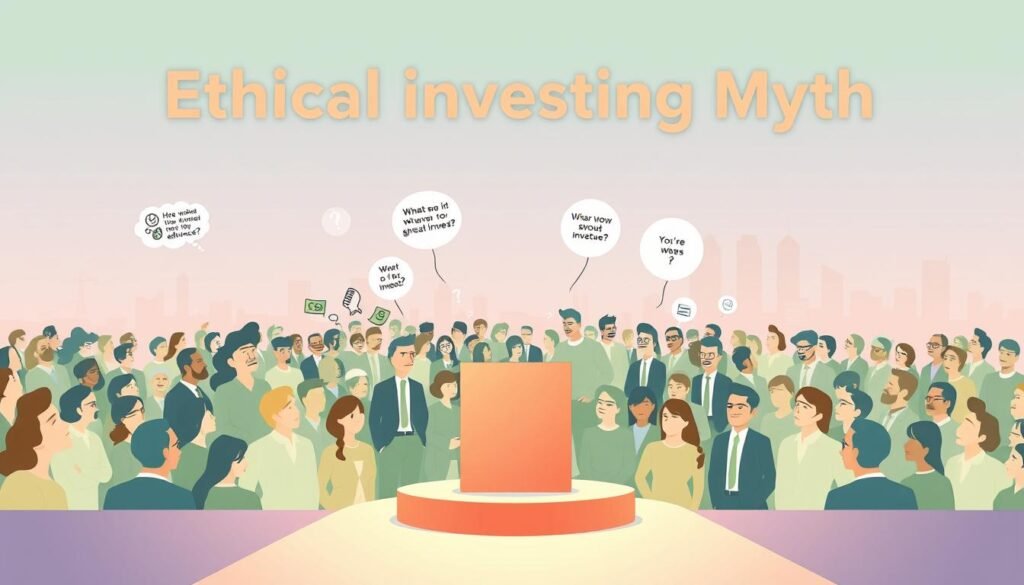Making conscious investment decisions is becoming increasingly important for individuals looking to grow their wealth while positively impacting society and the environment.
As a beginner, navigating the world of green finance and sustainable investing can seem daunting. However, it’s a commitment to aligning your investments with your personal values.
By choosing sustainable investment options (Ethical Investment Strategies), you can contribute to a more environmentally friendly future while potentially achieving your financial goals.
Key Takeaways
- Understand the importance of conscious investing.
- Learn how to align your investments with your personal values.
- Discover the benefits of sustainable investing.
- Explore green finance options for beginners.
- Start your journey towards environmentally friendly investments.
What Is Ethical Investing?
The world of investing is undergoing a transformation with the rise of ethical investing, which considers environmental, social, and governance (ESG) factors. This approach to investing is not just about generating returns; it’s about making a positive impact on society and the environment.
Ethical investing is grounded in a philosophy that seeks to align financial decisions with personal values and societal needs. It’s an investment strategy that looks beyond financial returns to consider the broader implications of investment choices.
The Philosophy Behind Conscious Investing
The philosophy behind conscious investing is rooted in the belief that investment decisions can influence corporate behavior and contribute to a more sustainable future. By choosing to invest in companies that adhere to high ESG standards, investors can promote positive change.
The Triple Bottom Line: People, Planet, Profit
The triple bottom line approach is a key concept in ethical investing, focusing on three critical dimensions: people, planet, and profit. This framework encourages investors to evaluate companies based not only on their financial performance but also on their social and environmental impact.
By adopting this holistic approach, ethical investors can contribute to a more equitable and sustainable world while pursuing their financial goals.
The Ethical Investment Landscape in Australia
Australia’s ethical investment landscape is rapidly evolving, driven by growing demand for sustainable finance options. This growth is supported by various institutions and a regulatory framework that encourages ethical investments.
Current Market Size and Growth
The Australian ethical investment market has seen significant growth in recent years. According to recent reports, the market size has expanded substantially, driven by increasing investor awareness and demand for ESG-compliant investments. Sustainable investing is becoming the new normal, with many investors now considering ESG factors as crucial to their investment decisions.
Australian Regulatory Framework
The Australian regulatory framework plays a crucial role in supporting the growth of ethical investments. Regulatory bodies have implemented various guidelines and standards to ensure transparency and accountability in ESG reporting. This framework helps investors make informed decisions and promotes a culture of sustainability among businesses.
Key Australian Ethical Investment Institutions
Several key institutions are driving the growth of ethical investments in Australia. These include organizations that specialize in ESG research, ethical managed funds, and green finance initiatives. They provide investors with a range of options to align their investments with their values and contribute to a more sustainable future.
ESG Criteria: The Foundation of Ethical Investing
ESG criteria form the backbone of sustainable investing, guiding investors towards conscious choices. These criteria are essential for evaluating a company’s sustainability and ethical impact, ensuring that investments align with the values of ethical investors.
Environmental Factors in the Australian Context
In Australia, environmental factors under ESG criteria include a company’s carbon footprint, energy efficiency, waste management, and conservation efforts. Investors are increasingly looking at how companies address climate change, invest in renewable energy, and comply with environmental regulations. For instance, companies involved in the extraction and use of fossil fuels are under scrutiny for their environmental impact.

Social Responsibility Metrics
Social responsibility metrics assess a company’s relationships with its stakeholders, including employees, customers, and the broader community. This includes factors such as labor practices, human rights, community engagement, and customer satisfaction. Companies that demonstrate strong social responsibility are more likely to foster a positive reputation and long-term sustainability.
Governance Standards for Australian Companies
Governance standards evaluate a company’s leadership, executive pay, audits, and shareholder rights. In Australia, companies are expected to maintain transparent governance structures, ensuring accountability and ethical business practices. This includes having independent board members, adopting anti-corruption measures, and ensuring fair executive compensation.
By focusing on these ESG criteria, investors can make more informed decisions that not only potentially yield financial returns but also contribute to a more sustainable and equitable future.
Ethical Investment Strategies for Beginners
As a beginner in ethical investing, it’s crucial to understand the different strategies that can help you grow your wealth consciously. Ethical investing is about making informed decisions that not only benefit your financial portfolio but also contribute positively to the environment and society.
Starting with Values-Based Investing
Values-based investing involves aligning your investments with your personal values and ethical principles. For instance, if you’re passionate about environmental conservation, you might invest in companies that prioritize sustainability. This approach allows you to make a positive impact while potentially benefiting from long-term financial returns. To get started, identify your core values and research investment opportunities that resonate with them. You can explore ethical investing resources to learn more about aligning your investments with your values.
Implementing Negative and Positive Screening
Screening is a fundamental strategy in ethical investing, involving the selection or exclusion of investments based on specific criteria. Negative screening excludes companies or industries that don’t meet certain ethical standards, such as those involved in fossil fuels or tobacco. On the other hand, positive screening involves actively seeking out companies that excel in environmental, social, and governance (ESG) criteria. For example, a company that has made significant strides in reducing its carbon footprint or promoting diversity and inclusion might be considered for positive screening.
| Screening Type | Description | Example |
|---|---|---|
| Negative Screening | Excluding companies that don’t meet ethical standards | Avoiding investments in fossil fuel companies |
| Positive Screening | Selecting companies with strong ESG practices | Investing in companies with high renewable energy usage |
ESG Integration for Newcomers
ESG integration involves incorporating environmental, social, and governance factors into your investment decisions. For newcomers, starting with a basic understanding of ESG criteria is essential. You can begin by looking at ESG ratings provided by various rating agencies, which assess companies based on their ESG performance. This information can help you make more informed investment choices that align with your ethical considerations.
Impact Investing on a Small Scale
Impact investing focuses on generating both financial returns and positive social or environmental impact. Even on a small scale, you can make a difference by investing in projects or companies that address specific social or environmental challenges. For example, investing in a community development project or a renewable energy startup can have a tangible impact. As a beginner, you can start by exploring micro-investing platforms that offer ethical investment options, allowing you to invest small amounts while making a positive difference.
By understanding and implementing these ethical investment strategies, beginners can confidently start their journey towards conscious investing. Whether it’s through values-based investing, screening, ESG integration, or impact investing, there are numerous ways to make your investments align with your ethical principles.
Financial Performance of Ethical Investments
Ethical investments are no longer just a moral choice; they’re also being evaluated for their financial returns. As investors increasingly seek to align their portfolios with their values, understanding the financial performance of ethical investments is crucial.
Historical Returns of Australian Ethical Funds
Studies have shown that ethical investments can match or outperform traditional investments. For instance, a study by Research Affiliates found that ESG (Environmental, Social, Governance) investing has not come at the cost of returns. In fact, many Australian ethical funds have delivered competitive returns over the past decade.
- Some of the top-performing ethical funds in Australia have seen returns of over 8% annually.
- The growth of ethical investing has led to an increase in the number of ethical funds available, providing investors with a broader range of choices.
Risk Profiles of Ethical vs. Traditional Investments
When comparing the risk profiles of ethical and traditional investments, the evidence suggests that ethical investments are not inherently riskier. In some cases, they may even offer a more stable investment option due to their focus on sustainable practices and governance.
A key consideration for investors is that ethical investments often involve companies with strong ESG practices, which can lead to lower volatility and potentially better long-term performance.
Common Myths About Ethical Investing Debunked
The world of ethical investing is riddled with misconceptions that need to be debunked for investors to make informed decisions. Ethical investing, also known as socially responsible investing, involves making investment decisions based on ethical, social, and environmental criteria. As this investment approach continues to gain popularity, it’s essential to separate fact from fiction.
The “Performance Penalty” Misconception
One of the most persistent myths about ethical investing is that it comes with a performance penalty. Many investors believe that by choosing ethical investments, they are sacrificing financial returns for the sake of their values. However, numerous studies have shown that this is not necessarily the case. In fact, some ethical investments have outperformed their traditional counterparts. For instance, a study by Morningstar found that sustainable funds often performed as well as, if not better than, traditional funds.
Beyond Niche: The Growing Mainstream Appeal
Another myth is that ethical investing is a niche interest that appeals only to a small group of environmentally conscious investors. However, the reality is that ethical investing is becoming increasingly mainstream. More investors are recognizing the importance of aligning their investments with their values. This shift is driven by growing awareness of environmental, social, and governance (ESG) issues and the desire to contribute to a more sustainable future.
Greenwashing: How to Spot and Avoid It
Greenwashing, or the practice of making false or misleading claims about the environmental or social benefits of an investment, is a significant concern in ethical investing. To avoid falling victim to greenwashing, investors should look for transparency and robust ESG reporting. They can also rely on third-party certifications and ratings from reputable organizations. Some key red flags include vague or unsubstantiated claims, lack of clear ESG metrics, and investments that claim to be “sustainable” without providing evidence.

By understanding and debunking these common myths, investors can make more informed decisions and contribute to a more sustainable financial future.
Defining Your Personal Ethical Investment Framework
Your personal ethical investment framework serves as the foundation for making informed, value-aligned investment decisions. It’s a tailored approach that considers your financial goals, risk tolerance, and personal values.
Identifying Your Core Values
Identifying your core values is the first step in establishing your ethical investment framework. This involves reflecting on what matters most to you, whether it’s environmental sustainability, social justice, or corporate governance. Consider the issues that you feel strongly about and would like to see addressed through your investments.
For instance, if you’re passionate about climate action, you may prioritize investments in renewable energy or companies with strong environmental track records. Listing your core values helps in making decisions that align with your ethical standards.
Setting Realistic Financial Goals
Setting realistic financial goals is crucial in creating an effective ethical investment strategy. Determine what you want to achieve through your investments, whether it’s long-term growth, income generation, or capital preservation. Ensure your goals are specific, measurable, achievable, relevant, and time-bound (SMART).
- Assess your current financial situation and risk tolerance.
- Decide on the investment horizon and expected returns.
- Consider the impact of fees and charges on your investments.
Creating Your Ethical Investment Policy
Creating your ethical investment policy involves translating your core values and financial goals into actionable investment decisions. This policy should outline the criteria for selecting investments, the process for ongoing monitoring, and the criteria for divesting.
“The key to successful ethical investing is not just about avoiding harm, but also about creating positive change.”
By following these steps, you can develop a comprehensive ethical investment framework that not only aligns with your values but also helps you achieve your financial objectives.
Ethical Investment Vehicles for Australian Beginners
The Australian ethical investment landscape offers a range of choices for beginners, from managed funds to green bonds. As the demand for conscious investing grows, so does the variety of financial products available to Australian investors.
Ethical Managed Funds on the ASX
Ethical managed funds are a popular choice for beginners. These funds are listed on the Australian Securities Exchange (ASX) and allow investors to pool their money into a diversified portfolio that adheres to ethical criteria. Investors can benefit from professional management and a broad range of investment strategies. Examples include funds that focus on renewable energy or exclude industries such as tobacco or fossil fuels.
Australian Ethical ETFs
Exchange-Traded Funds (ETFs) are another attractive option. They offer the flexibility of trading on the ASX while providing diversification. Ethical ETFs track indices that are composed of companies meeting specific ESG (Environmental, Social, Governance) criteria. This allows investors to gain exposure to a broad ethical market with a single investment.
Green Bonds and Climate Bonds
Green bonds and climate bonds are fixed-income instruments specifically earmarked for financing environmentally friendly projects. These bonds offer a relatively low-risk investment option for those looking to support climate action while generating returns. They are issued by various entities, including governments and corporations.
Ethical Superannuation Options
For long-term investing, ethical superannuation options are worth considering. Many Australian superannuation funds now offer ethical investment options that align with the values of their members. These options allow individuals to invest their retirement savings in a manner consistent with their ethical beliefs, potentially influencing positive change in the corporate world.
By understanding these ethical investment vehicles, Australian beginners can make informed decisions that align with their financial goals and personal values.
How to Research and Evaluate Ethical Investments
To make informed decisions, it’s crucial to understand how to research and evaluate ethical investments effectively. This involves a comprehensive approach that considers various factors, including ethical certification standards, ESG ratings, and the use of digital tools.
Australian Ethical Certification Standards
Australia has several certification standards that help identify ethical investments. The Responsible Investment Association Australasia (RIAA) certification is one such standard that ensures investments meet certain ethical and sustainability criteria. When researching ethical investments, look for certifications like RIAA to ensure that the investment aligns with your values.
Using ESG Ratings and Sustainability Reports
ESG ratings and sustainability reports are crucial tools for evaluating the ethical performance of investments. ESG ratings assess a company’s environmental, social, and governance practices, providing insights into its sustainability and ethical standing. Sustainability reports, on the other hand, offer detailed information on a company’s sustainability initiatives and progress. Investors can use these resources to make informed decisions about their investments.
Digital Tools for Ethical Investment Research
The rise of digital tools has made it easier for investors to research and evaluate ethical investments. Platforms like Morningstar and ESG Screen provide access to ESG ratings, sustainability reports, and other relevant data. These tools enable investors to compare different investment options and make informed decisions based on their ethical priorities.
By leveraging these resources and understanding the various certification standards and reports, investors can confidently research and evaluate ethical investments that align with their values and financial goals.
Building Your First Ethical Portfolio
As you start your ethical investing journey, constructing a well-diversified portfolio is key to long-term success. This involves making informed decisions about asset allocation, selecting investments that align with your ethical goals, and ensuring that your portfolio remains resilient in various market conditions.
Asset Allocation for Different Ethical Goals
Asset allocation is a critical component of building an ethical portfolio. It involves distributing your investments across different asset classes, such as stocks, bonds, and real estate, to balance risk and return. For ethical investors, this also means considering the ethical implications of each investment. For instance, if your goal is to support renewable energy, you might allocate a larger portion of your portfolio to green bonds or stocks in companies leading the transition to clean energy.
To illustrate how different asset allocations can impact your portfolio, consider the following table:
| Asset Class | Conservative Allocation | Moderate Allocation | Aggressive Allocation |
|---|---|---|---|
| Stocks | 30% | 50% | 70% |
| Bonds | 60% | 40% | 20% |
| Real Estate | 10% | 10% | 10% |
Diversification Across Ethical Themes
Diversification is another crucial strategy for ethical investors. By spreading your investments across various ethical themes, such as environmental sustainability, social justice, and good governance, you can reduce the risk associated with any single investment. For example, you might invest in a mix of companies that are leading in renewable energy, those that are making significant strides in social responsibility, and those with exemplary governance practices.
Micro-investing platforms have made it easier for individuals to start investing with small amounts of money. These platforms often offer pre-built portfolios that include ethical investment options, making it simpler for beginners to get started.
Micro-Investing Platforms with Ethical Options
Micro-investing platforms are an excellent way for new investors to enter the market. Many of these platforms now offer ethical investment portfolios that are designed to align with various ethical criteria. By using these platforms, you can start building your ethical portfolio with a small initial investment and gradually increase it over time.
Tax Considerations for Australian Ethical Investors
Ethical investing in Australia isn’t just about making a positive impact; it’s also about understanding the tax benefits and obligations that come with it. As ethical investments continue to grow in popularity, it’s essential for investors to be aware of the tax implications that can affect their investment decisions.
Tax Benefits of Sustainable Investments
Sustainable investments in Australia can offer several tax benefits. For instance, investments in renewable energy projects may be eligible for tax incentives, such as deductions for capital expenditures. Additionally, some ethical investments may qualify for tax credits if they contribute to environmental conservation or social welfare. Understanding these benefits can help investors make more informed decisions that align with their financial and ethical goals.
Reporting Requirements and Documentation
Australian ethical investors must also comply with specific reporting requirements and maintain accurate documentation. This includes keeping records of investments, dividends received, and any tax deductions claimed. Investors should be aware of the need to report their investments in their tax returns, including any capital gains or losses. Accurate record-keeping is crucial for ensuring compliance with Australian Taxation Office (ATO) regulations and for maximizing tax benefits.
By understanding the tax considerations associated with ethical investments, Australian investors can better navigate the complexities of the tax system and make more informed investment decisions.
Monitoring and Evolving Your Ethical Portfolio
As an ethical investor in Australia, it’s crucial to regularly monitor your portfolio to ensure it remains aligned with your values and financial goals. Ethical investing is a dynamic process that requires ongoing attention to both the financial performance and the ethical standing of your investments.
Regular Ethical and Financial Reviews
Conducting regular reviews is vital to ensure your investments continue to meet your ethical criteria and financial expectations. This involves checking the ESG (Environmental, Social, Governance) ratings of your investments and assessing their financial performance. You can use various tools and resources, such as ESG reports and financial news platforms, to stay informed.
A regular review might involve assessing whether the companies you’re invested in are maintaining their ethical standards. For instance, if a company you’ve invested in is suddenly involved in a controversy, you may need to reconsider your investment.
| Review Criteria | Indicators | Actions |
|---|---|---|
| ESG Ratings | Changes in ESG scores | Reassess investment |
| Financial Performance | Profitability, revenue growth | Adjust portfolio |
| Ethical Controversies | Involvement in unethical practices | Consider divestment |
When to Divest: Red Flags and Triggers
Knowing when to divest is as important as knowing where to invest. Red flags might include a company’s increasing involvement in industries you find unethical, poor governance, or significant environmental damage. If a company you’ve invested in is consistently failing to meet your ethical criteria, it may be time to divest.
Some triggers for divestment include regulatory changes that negatively impact a company’s operations, significant ethical breaches, or a decline in ESG ratings. Regularly reviewing these factors will help you make informed decisions about your investments.
The Future of Ethical Investing in Australia
The landscape of ethical investing in Australia is evolving, driven by climate action, indigenous initiatives, and technological advancements. As the world grapples with the challenges of climate change, social inequality, and economic instability, ethical investing is becoming increasingly important.
Climate Action and Net-Zero Investments
Climate action is a significant driver of the future of ethical investing in Australia. Investments in renewable energy, clean technologies, and sustainable infrastructure are expected to grow. The transition to a net-zero economy presents both opportunities and challenges for investors, with a focus on reducing carbon footprints and supporting climate resilience.
Indigenous Business and Reconciliation Investing
Indigenous business and reconciliation investing are gaining traction, with initiatives aimed at promoting economic development and self-determination among Indigenous Australians. Ethical investors are increasingly looking to support businesses that contribute to Indigenous reconciliation and community development.
Technology Disruption and Ethical Opportunities
Technological disruption is creating new ethical investment opportunities in Australia. From fintech innovations to sustainable technologies, investors are leveraging technology to drive positive change while generating returns. The intersection of technology and ethics is expected to be a key area of growth in the ethical investment landscape.
Conclusion
As we’ve explored throughout this article, ethical investment strategies offer a powerful way to align your financial decisions with your personal values, contributing to a more sustainable future. By understanding the principles of ethical investing, including the importance of ESG criteria and the various investment vehicles available, you can make informed decisions that not only benefit your financial wellbeing but also positively impact the environment and society.
The Australian ethical investment landscape is rapidly evolving, with a growing range of options for investors. From ethical managed funds and ETFs to green bonds and sustainable superannuation, there’s never been a better time to start your ethical investment journey. By adopting a values-based approach and leveraging the tools and resources available, you can create a portfolio that reflects your commitment to sustainable investing.
As you move forward, remember that ethical investing is a journey, not a destination. Stay informed, regularly review your portfolio, and be prepared to adapt to changing market conditions and your own evolving values. By doing so, you’ll be well on your way to achieving your financial goals while contributing to a more sustainable future for all.





